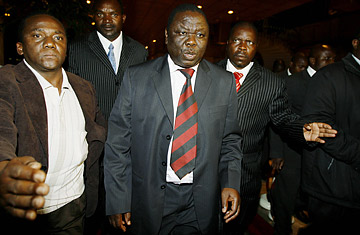
Zimbabwean MDC opposition leader Morgan Tsvangirai leaves the Rainbow towers hotel in Harare on August 11, 2008 after negotition talks on the Government of National unity.
With no substantive comment from either side after three weeks of negotiation, the progress of power-sharing talks between the leader of the Zimbabwean regime, Robert Mugabe, and his opposition rival, Morgan Tsvangirai, remain a mystery. But some hint of the atmosphere in which they are being conducted emerged Thursday when Zimbabwean security forces briefly detained Tsvangirai, his deputy — Movement for Democratic Change (M.D.C.) general secretary Tendai Biti — and a third M.D.C. official. The three were held at Harare airport and, after their passports were confiscated, prevented from leaving the country to attend a weekend summit of southern African leaders in Johannesburg, South Africa. Biti said the incident raised questions about the Mugabe regime's true intentions. "This is a reflection of their insincerity," he told reporters at the airport. "They want to talk to us. Yet they behave like hooligans."
Mugabe announced his intention to share power with the opposition after 28 years of one-man rule in late June, at his inauguration for his sixth term as president. The move was a surprise. A few days before, Mugabe had emerged as sole candidate in the election for president, meant as a second-round run-off between him and Tsvangirai, after the opposition leader pulled out in the face of violence unleashed by Mugabe's security forces and their allied militias. On Wednesday, Human Rights Watch reported the regime and its supporters had killed 163 M.D.C. activists and tortured or beaten 5,000 more since Tsvangirai came out ahead in a first round of polling on March 29. But Mugabe has apparently been shaken by the rejection of his legitimacy by three separate African poll monitoring groups and other criticism from within the continent. Immediately after his bloody victory, Zimbabwe's president signalled his intention to open a dialogue with Tsvangirai.
It is difficult to overstate the importance of such a deal. If the legitimacy of its government were even partially restored, the world could re-engage Zimbabwe and help end the economic crisis that has seen inflation spiral out of control, ruined all but the regime's elite and sent millions of refugees into neighboring Botswana, Zambia and South Africa. Economists predict recovery would be quick: though its currency is worthless, its farms moribund and its industry largely mothballed, Zimbabwe retains good heavy infrastructure, such as roads, buildings and airports. A deal would also signal the passing of an era for all Africa: Mugabe, the symbol of the generation that liberated the continent from colonial and white rule, voluntarilty ceding authority to fresher political ranks. Without a political deal, however, other old-style African despots — of which there remain a few — will be encouraged to continue ignoring their people, and a crisis that has burdened all southern Africa, and contributed to deadly anti-immigration riots in South Africa, will continue.
Since talks began on July 22, however, there has been little word on any progress. The central sticking point is how to divide power between Mugabe and Tsvangirai. After a week, the talks hit their first roadblock when the M.D.C. rejected as "insulting" an initial offer by Mugabe's regime to make Tsvangirai one of three vice presidents. [Zimbabwe's other two vice presidents are ranking members of the ruling Zimbabwean African National Union-Patriotic Front (Zanu-PF) party, and perform a largely ceremonial role.] Since then, there has been little authoritative word — and much wild speculation — on how the talks were proceeding. Some analysts predict negotiations will last months, if not years.
Before his tussle with the security services on Thursday, Tsvangirai had issued a statement vowing to stick with the discussions. "We knew negotiations would be difficult," he said. "But a resolution that represents anything other than the will of the Zimbabwean people would be a disaster for our country." That apparent reference to his scoring a larger share of the vote in March suggests Tsvangirai still insists that the lion's share of power be his. Mugabe's enthusiasm for the same is plain. As ever, Zimbabwe's rennaissance seems a long way off.
